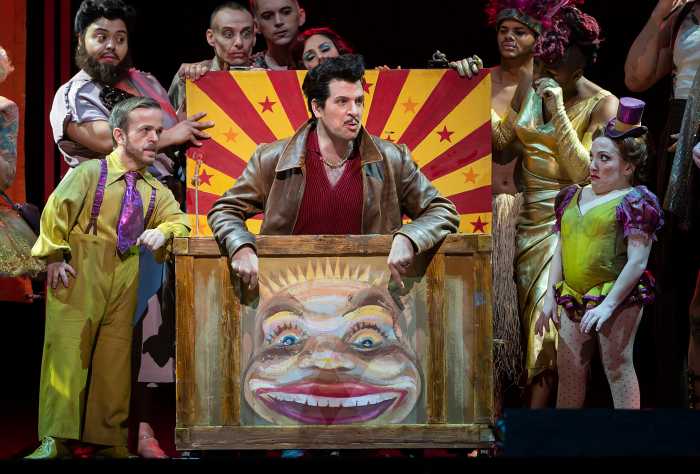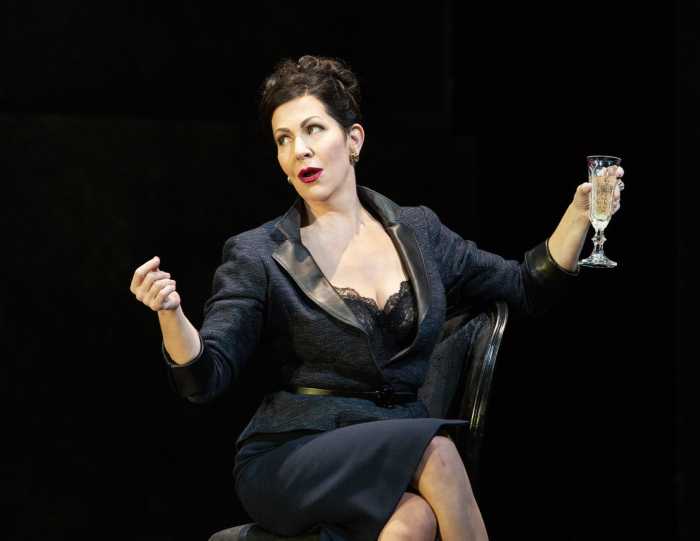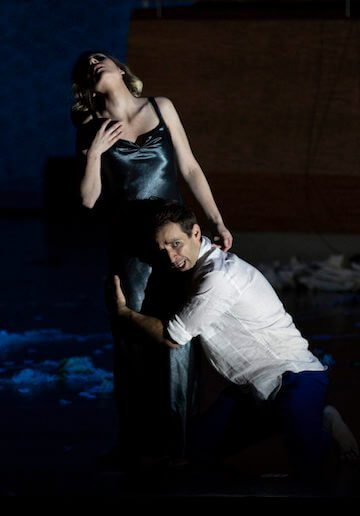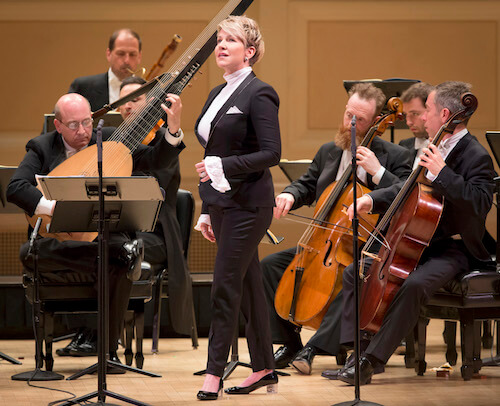Ludovic Tézier and Loïc Félix in Donizetti’s “La Favorite,” performed in Paris’ elegant Theatre des Champs-Elysees. | VINCENT PONTET/ WIKISPECTACLE
It was exciting to hear one of Donizetti’s final operas, 1840’s “La Favorite,” in the language and city — though not the theater — for which it was conceived. The elegant Theatre des Champs-Elysees has only graced Paris since 1913.
Despite serious flu besetting both female principals — Alice Coote (Leonor) and Judith Gauthier (Inés) — the February 7 premiere delivered a musically instructive evening. This score — heard rarely, and almost always in its inferior Italian version, in the US — marks a midpoint stylistically between the tremendous French “grand operas” by Italian composers that bookend the form, Rossini’s “Guillaume Tell” and Verdi’s “Don Carlos.”
Lyric tragedies in Paris and New York
Neither Paolo Arrivabeni’s competent conducting nor Valérie Nègre’s rather silly production raised the temperature. As in David Alden’s Met “Ballo,” the directorial response to bouncy rhythms was to have Lucie Deroian’s fine-sounding chorus “guy” them with dance steps. Otherwise, the blocking was remarkably stodgy, with ensembles finding the leads lined up across the stage. Andrea Blum’s cheap minimalist set evoked a fire sale at an IKEA. Fortunately, Aurore Popineau’s well-cut costumes lent some visual dignity to the proceedings.
The audience adored baritone Ludovic Tézier (Alphonse), one of France’s few truly international class singers. His performance was aptly kingly and, once past some choppy phrasing, very handsomely voiced. Belgian tenor Marc Laho, a fairly late substitute as the naive Fernand, is only a “diligent” actor, but he sang with remarkable poise and clarity in the float-based style of his great teacher Alain Vanzo. What a pleasure to hear Tézier, Gauthier, tenor Loïc Félix as the Iago-like Gaspar, and particularly Laho articulate sung French!
Neither Coote nor Carlo Colombara — the somewhat wooly but sonorous Balthasar — achieved complete Gallic command, but both sang with sweep and feeling, and the mezzo at least interpreted every word. Given her illness, Coote sounded remarkably full of voice in a wide-ranging part, and as always she proved a riveting — if not always graceful — stage animal. Bel canto perhaps isn’t her true home, but Leonor was worth her endeavor.
More late career Donizetti awaited at Juilliard, with James Robinson’s amusing and smart production of the composer’s most urbane comedy, “Don Pasquale.” Heard February 17, it was a delight. Set — with some details fudged — in the “Mad Men” era, which is threatening to wear out its welcome, the show (sets by Shoko Kambara, costumes by Amanda Seymour) looked wonderful.
Robinson occasionally over-egged the pudding, provoking laughs at musically inopportune moments — like right before skilled, totally secure alumnus tenor Javier Abreu’s rueful initial aria. But the characters were well defined, the overall arc well paced. Taking unusually bold comic chances, Jeongcheol Cha proved a highly amusing Pasquale, stylishly vocalized. Deanna Breiwick (Norina) looked and sounded fresh and beautiful, with good projection and trills. Sometimes she was asked to apply undue “character,” shading to bel canto lines. With a touch of gravel at the bottom, suave baritone Tobias Greenhalgh (Malatesta) seemed promising but less advanced in his training as to line and authentic Italian diction, though he dispensed good-fellowship plastique for days.
The only question this performance left about Stephen Lord’s masterful well-balanced conducting is why aren’t we hearing it at the Met instead of the mediocre likes of Maurizio Benini? Admirably, Lord played repeat verses and bridge material sometimes cut. For that matter, Robinson has a far better track record as an opera director than the Broadway-linked tyros given carte blanche to ruin the likes of “Sonnambula” and “Tales of Hoffmann” there lately.
“Don Carlo” — in the Italian translation the Met has used since 1920 — is one of the greatest of Parisian grand operas. It’s such a noble work of music and drama that it had some effect February 28 despite conducting from Lorin Maazel that was, except at rare moments, distended and lifeless. Whose idea was his re-engagement? That person deserved some of Maazel’s boos.
The Nicholas Hytner production is the clearest example of a beautiful and functional staging being junked for a cheap-looking, ineffective, and gimmicky one — a real shame, full of bad ideas (cutting the woodsmen’s chorus, having court ladies and not starving peasants importune Elisabetta for peace, a priest declaiming over the auto-da-fe music, and a totally botched final tableau). The costumes and lighting do battle with the plastic, flimsy looking sets.
Ferruccio Furlanetto’s Philip towered above everybody — a Golden Age performance. When will the Met hear his Boris? Eric Halfvarson’s grand scale Grand Inquisitor met Furlanetto near his own level. Dmitri Hvorostovsky was his usual handsome inert self as Posa, but sang quite wonderfully. Ramon Vargas (Don Carlo) and Barbara Frittoli (Elisabetta) are both fine, musical artists who act and phrase with care and insight. Both now sound tight at the top of their range, and her constriction on almost everything above a G was genuinely distressing, mitigating many of her good intentions.
Anna Smirnova has lost some weight and moved more gracefully than before, but her artistic intentions remain pretty much vulgar and her intonation imprecise due to a buzz saw vibrato. The only distinguished comprimario performances were Jennifer Holloway’s appealing Tebaldo and a solid set of Flemish Deputies.
Leading the fantastic English Concert from the harpsichord, Harry Bicket kicked off a three-season Carnegie series of Handel works in concert with a starry, exciting “Radamisto” that had been touring Europe. Bicket assembled a great cast from top to bottom. Baritone David Kravitz, the patriarch Farasmane, had no arias but sang well. The five leads were major Handelians, all of whom seized ample opportunities to shine.
David Daniels in the title role and Patricia Bardon as his wife Zenobia have been leaders in this repertory for two decades. Whatever slight inroads time has made on their lower register resonance found ample compensation in musical insight, absolute stylistic mastery, and — in both cases — much seasoned, lovely tone. As Radamisto’s sister, Brenda Rae’s timbre was rather narrow, but she proved technically quite spectacular and affecting. Luca Pisaroni channeled verbal bite, seductive tone and fine florid work as the villain Tiridate. Is there a better Handelian bass today?
The most beautiful sounds of all flowed with delightful style from the supremely talented Joélle Harvey as the noble warrior Tigrane. Next year, Bicket and Daniels return in “Theodora” with the smashing Dorothea Röschmann.
David Shengold (shengold@yahoo.com) writes about opera for many venues.



































